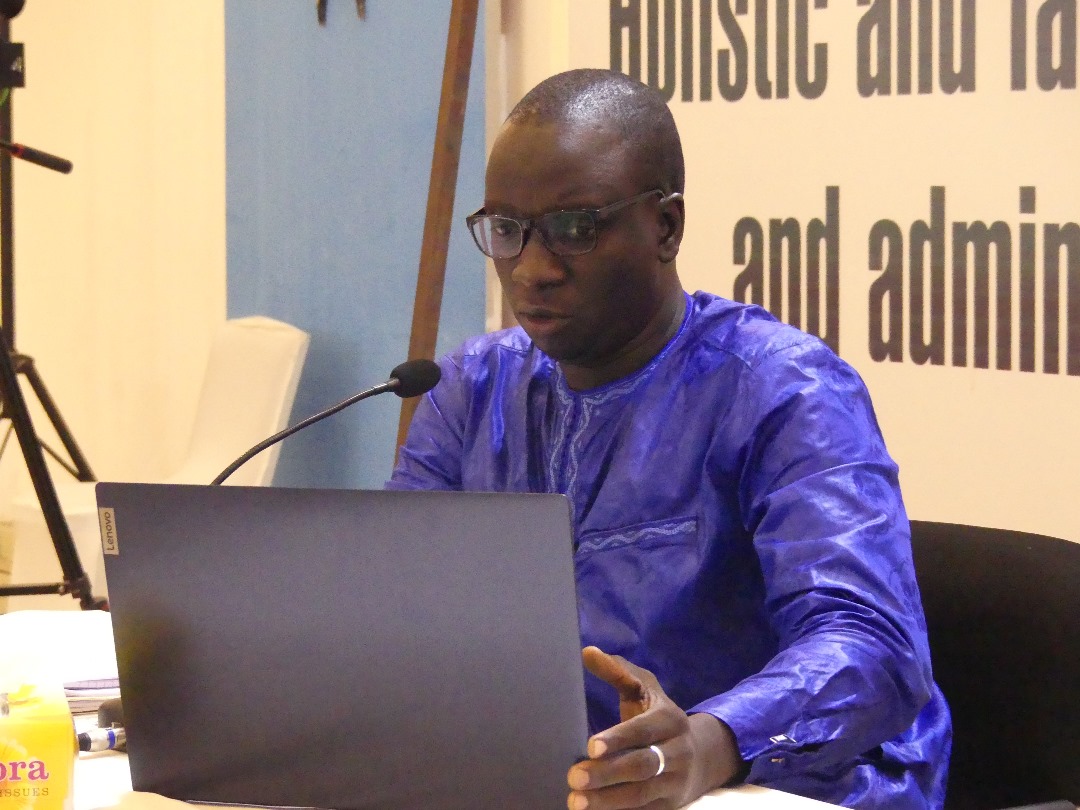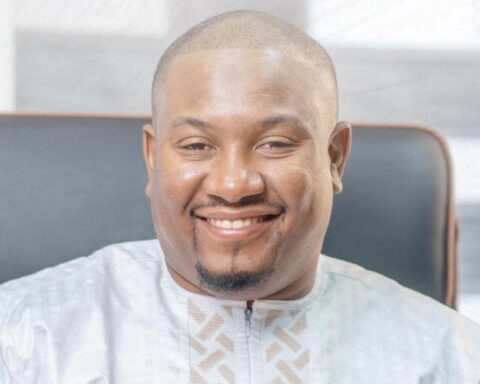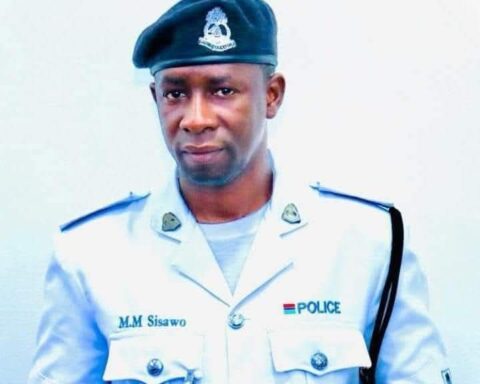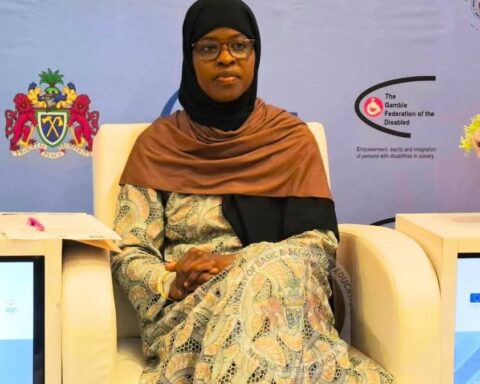Modou Jonga is a Jalangbang Village and a former CEO of thr Brikama Area Council. He began working in the Council on the 14 April 2009 as the Council Clerk. He was reassigned the Public Relations Officer (PRO) in November 2009 and was promoted as a Senior Administrative Officer in July 2010. He was promoted as the Principal Administrative Officer in April 2013, redeployee as the Director of Administration in November 2015 and promoted as the CEO in November 2019.
Before working for the Brikama Area Council, Jonga is qualified teacher and was teaching. He worked for Foroyaa Newspaper from 2004 to 2008 as a Senior Reporter for West Coast Region.
The witness said as the CEO his functions were to manage the welfare of the council, serve as the accounting officer of the council and preside over the day-to-day activities of the Council. He added that he used to do daily briefing to the Chairman of the Brikama Area Council in terms of policy matters and he used to provide him technical advice.
The witness said the Council was supposed to sit at least once every month, but there were months that the Council failed to sit. He added that the reason was because they do not have agenda to sit. Lead Counsel Gomez told the witness the reason lacked merit because there were many issues to discuss pertaining to the welfare of the people of the area.
The witness said in some instances they did not adhere to the procurement rules. He explained that when he came the compliance level was very low before his coming, but when he came he ensured there was improvement. He stated the audit queries used to be “adverse”, but he was able to improve the system that to “qualified”. He said he introduced procurement plan, fixed asset register and procurement became participatory among others. He added that the Council increased supports to communities with feeder roads, solar lighting and water borehole systems, and increased scholarship for students. He added that they engaged in road rehabilitation, rehabilitation of women graden, borehole rehabilitation, fence a football field, constructed toilet facilities and constructed markets. He said they disbursed D2.5 million in 2019 and D2 million in 2020 to the wards for their development.
The witness said his references were the Financial Manual, the Local Government Act and the Local Government Finance and Audit Act. He claimed that most of the spending was in line with the budget.
The witness was asked why there was no internal audit report in 2021. He said it was the fault of the Internal Audit Unit, adding that he did not restrict them from doing their work. He was referred to the Financial Manual regarding his oversight function over all the units to ensure that they do their work. After reading it, he said he did not request for the Internal Audit Unit to do auditing to know the status of the Council. He declined from accepting liability for his failure to perform oversight over the Internal Audit Unit. He noted that he has the responsibility to perform oversight over the Unit.
The witness said in 2020 they did not have an approved plan. Instead, they were using the draft plan to do procurement. He added that the plan was prepared and submitted for approval, but they never have approval.
“Having a plan that is not approved is better than not having a plan at all,” the witness said.
“Are you serious?” Lead Counsel Gomez asked.
The Counsel referred the witness to the Gambia Public Procurement Authority (GPPA) Act, which provides that procurement must be strictly based on the Act, its regulations and any other law created by the National Assembly. The witness after reading from the GPPA Act said this is to ensure strict adherence to the law in terms of procurement. He testified that the procurement plan is essential and mandatory. He maintained that making expenditures without a procurement plan was wrong.
The ex-CEO admitted that he used to receive money from the Council without signing for it. He said sometimes he used to be busy and he would call the cashier to pay him.
The audit report for 2020 indicated that salaries were paid amounting to over D32,000 without the recipients signing. The witness was asked where the money was, he said he cannot tell because he does not know.
He testified that they do not have a loan policy. He admitted that they were issuing loans without any policy. On how loans are approved, the witness said he used to seek advice from the Director of Finance on the availability of funds before approving loans. He said they do not have a loan file to keep track of the loans. Chairperson Jainaba Bah referred the witness to the Financial Manual on the issue of loan. The witness admitted that the way loan was issued by the BAC was contrary to the dictates of the Financial Manual.
The witness handed a voucher from the Brikama Area Council. After looking at the voucher, the witness said the voucher was not duly authorised. Immediately after saying this, he, in turn, said the vouchers were two – one was through Metrix System, which was duly authorised and the IFMIS one was not duly authorised. He said during this period he was not the CEO since it was dated July 2019 while he assumed office in November 2019.
He was given another voucher dated June 2020. He was asked to look at the voucher and advised the Commission on whether it was duly authorised or not. He said the voucher was not duly authorised. He choose the word “inadequate”. According to him, the Director of Finance signed the voucher, the auditors signed it and a few other fundamental requirements were fulfilled. The witness agreed that some other important requirements were missing such as the absence of the signature of the recipient and the signature of paying out cashier. He still maintained that the voucher was “inadequate” as there are gaps not fulfilled.
“We cannot confirm whether the payments were received or not,” the witness said.
“That is serious,” Gomez told the witness.
“Very serious,” the witness answered.
The witness said he authorised payments and it was his responsibility to cross-check before approving. The law requires the CEO to ensure that the vouchers are properly raised and supporting documents are provided before he sign.
He was asked how he supervised to know whether payments were made or not. He said he relies on the auditors to know whether payment is done. He was referred to the Financial Manual on the mechanisms put in place by the law for payments. He admitted that he was not following the provisions of the Financial Manual.
The witness said the withdrawal methods were “clearly wrong”. He added that the withdrawals of Amadou Saidykhan were for salary payments.
“Where you do not follow procedure there is no accountability. Do you agree with that?” Gomez said.
“Yes,” the witness said, adding that “We cannot account for all these withdrawals.”
The witness changed his statement and mentioned that he can account for all the withdrawals with the claim that there are vouchers to back the withdrawals.
The witness was told that most of the staff of the Brikama Area Council testified that they did not know about the Financial Manual. The witness replied that the Director of Administration is responsible for the induction of recruited staff. He said the witness should have taken “extra-miles” to know about the Financial Manual.
The witness was told if what he stated was correct, why he was directing the staff to flout the rules. He replied that he did not force anyone to make the withdrawals.
“I do not expect a Finance Manager to say he does not know whether the Finance Manual exists,” the witness said.
“Why do you make them to do illegal acts,” Gomez asked.
“At the time, we did not know these were illegal,” the witness answered.
“Why do you make them things you know were illegal?” Counsel Gomez asked.
“It is not proper to make them do that,” the witness answered.
The law requires payments to be made in the name of the payee (recipients). The witness admitted that the practice of paying cheques in the names of staff of the Council was wrong.
“The law envisages that the public funds need to be traced,” Gomez said.
“Yes, that is correct,” the witness replied, adding that “I am learning from this healthy conversation.”
He was asked to account for the withdrawals of the finance unit he authorised.
The later part of the testimony was mainly on the Financial Manual on control of finance and related matters. The witness will reappear tomorrow to discuss the financial issues.







